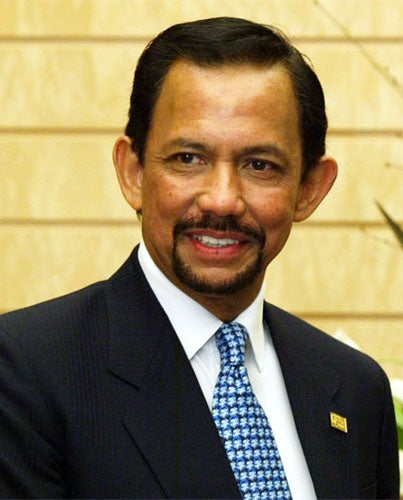Stoning for adulterers and amputation for thieves: Sultan of Brunei announces stricter punishments under Shariah Penal Code
The punishments are set to come into force over the next six months

Your support helps us to tell the story
From reproductive rights to climate change to Big Tech, The Independent is on the ground when the story is developing. Whether it's investigating the financials of Elon Musk's pro-Trump PAC or producing our latest documentary, 'The A Word', which shines a light on the American women fighting for reproductive rights, we know how important it is to parse out the facts from the messaging.
At such a critical moment in US history, we need reporters on the ground. Your donation allows us to keep sending journalists to speak to both sides of the story.
The Independent is trusted by Americans across the entire political spectrum. And unlike many other quality news outlets, we choose not to lock Americans out of our reporting and analysis with paywalls. We believe quality journalism should be available to everyone, paid for by those who can afford it.
Your support makes all the difference.The Sultan of Brunei has announced strict new Islamic punishments for criminals – including amputation for theft and stoning for adultery.
The punishments, which are set to come into force over the next six months, form part of the tiny, oil-rich monarchy’s new Shariah Penal Code and will apply to Muslims only.
In a speech unveiling the legalisation, Sultan Hassanal Bolkiah said the new code should be regarded as a form of “special guidance” from God and would be “part of the great history” of Borneo island.
He said: “By the grace of Allah, with the coming into effect of this legislation, our duty to Allah is therefore being fulfilled.“
Brunei's Shariah Islamic court had previously handled mainly family-related disputes. The sultan has been hoping to implement the new law for years to bolster the influence of Islam in Brunei, where Muslims comprise about two-thirds of the population of nearly 420,000 people.
The minorities are mainly Buddhist, Christians and people of indigenous faiths.
Brunei’s top Islamic scholar Mufti Awang Abdul Aziz told a legal conference that Shariah law in the country “guarantees justice for everyone and safeguards their well-being.”
He said: “Let us not just look at the hand-cutting or the stoning or the caning per se, but let us also look at the conditions governing them“
Awang went on to say: “It is not indiscriminate cutting or stoning or caning. There are conditions and there are methods that are just and fair.”
Under secular laws, Brunei already prescribes caning as a penalty for crimes including immigration offenses, for which convicts can be legally flogged.
Awang said, however, that there should be no concerns that foreign travellers might end up avoiding Brunei after the law is implemented.
“Please listen to our answer. Sir, do all potential tourists to Brunei plan to steal? If they do not, then what do they need to fear,” he said. “Believe me when I say that with our Shariah criminal law, everyone, including tourists, will receive proper protection.”
The implementation of Shariah criminal law is not expected to face vocal opposition in Brunei, which has long been known for conservative policies such as banning the public sale of liquor.
Sultan Hassanal, who has reigned since 1967, is Brunei's head of state with full executive authority. Public criticism of his policies is extremely rare in Brunei.
Join our commenting forum
Join thought-provoking conversations, follow other Independent readers and see their replies
Comments